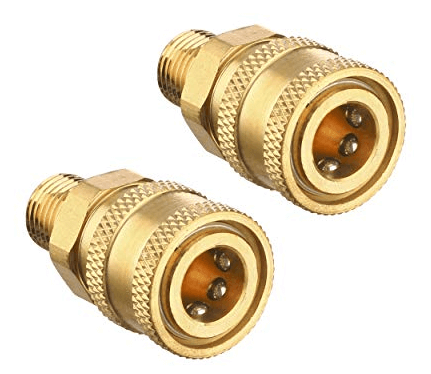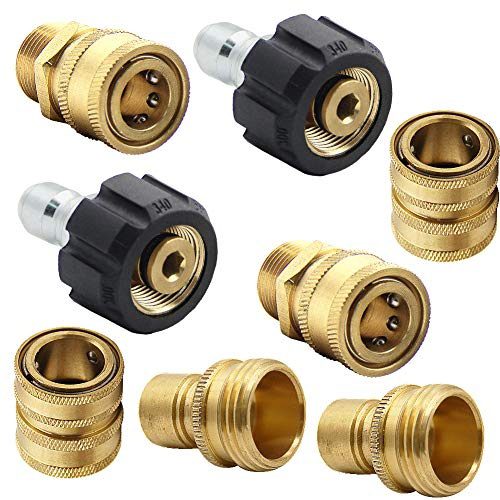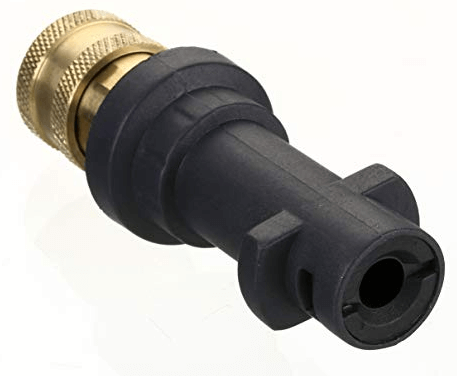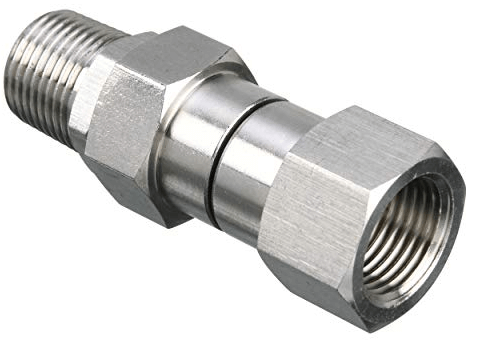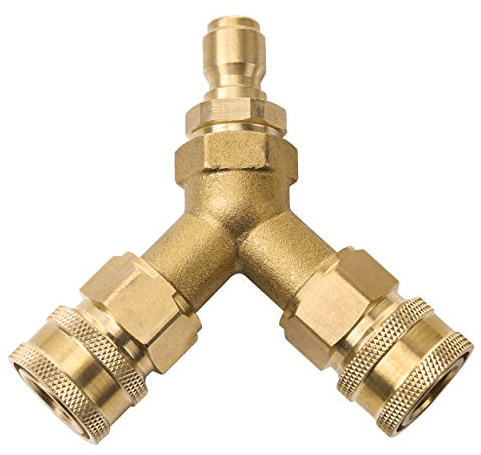If you are wondering what is the purpose of all the pressure washer fittings, then here is the answer to your doubts.
The purpose of pressure washer fittings is to connect the parts of the pressure washer. It enables you to connect the trigger gun and high-pressure hose or between the pressure hose and pump.
The pressure washer fittings come in the form of an adapter and most of them are available in packages that include couplers, adapters, and fittings.
Choosing among these fittings are as important as purchasing a pressure washer. Because these fittings make the job easier and pressure washer more beneficial and efficient.
If you want to know more about these fittings, you can refer to the detail guide mentioned in this article.
Outline
Toggle- What are Washer Fittings and When do you Need Them?
- What Are Different Types of Pressure Washer Fittings?
- Which Material is Considered the Best for Fittings of Pressure Washer?
- What are the Pressure Washer Fitting Sizes Available?
- Things to Consider While Purchasing Pressure Washers
- Some Frequently Asked Questions
- Few Words to Conclude
What are Washer Fittings and When do you Need Them?
A fitting represents adapter which joins pressure washer parts together. Some of the situations where fittings are…
- For joining more attachments to the pressure washer. Some of these attachments include surface cleaner, foamer, pressure gauge and others.
- For extending length of your pressure washer hose or add another one.
- When you want to use screw fittings for quick connection.
- When you want to prevent kinks in the hose using swivel fittings.
What Are Different Types of Pressure Washer Fittings?
In general, there are five different types of pressure washer fittings that include swivels, couplers, adapters, splitters and quick connect fittings.
We have mentioned clear description of each product below for your reference.
1. Couplers
Often called couplings, couplers are available in different sizes. It is perfect for nozzles, hose pipes, and pressure washer guns. What makes it ideal for a pressure washer is that it has anti-corrosive construction. There are also screw couplings or quick-release couplings for user convenience.
2. Adapters
Although an adapter is a coupler in its purpose, it can be used for specific types of coupling. An adapter can be used to attach attachments and convert different variants of fittings. It can be attached to a quick-disconnect female fitting or a nozzle tip.
For instance, you can join ¼ inch quick disconnect and female fitting at one end and use a nozzle top of ¼ inch plug to join another end – which is not possible without the adapter otherwise.
3. Quick Connect Tips
This fitting type is quite popular in pressure washer fittings as it allow to connect quickly -or disconnect screw connections. It makes it easy to remove the spray gun, pump, and hose. You can get quick-connect fittings in male or female. The female comes with O-ring are also referred as sockets. They are used for preventing leaks. While the male goes inside the female which is called as a plug. It comes with threading outside for connecting towards the female end. Some of these fittings come with attached nozzles so you can utilize them as adapters as well.
4. Swivels
You can stop the pressure water gun from kinking by using a swivel. The swivel hose can spin freely without twisting the spray gun as well as extension wand. It doesn’t matter if you move a little farther. It can also stop the pressure washer, thereby preventing tangling. It is the most preferred choice as they improve the experience of using a pressure washer.
5. Splitters
Splitters can be ordered in a Y-shaped shape that is great for improving PSI. Splitters allow you to join the two hoses of pressure washer, or attach two attachments. This is essentially a great tool for large jobs that require pressure washers with a GPM rating above 4.
Which Material is Considered the Best for Fittings of Pressure Washer?
1. Brass
What makes brass perfect for fittings is that it is corrosion-resistant. Brass is also very durable and comes at an affordable value. It is widely used as fittings and has a blend of copper alloy and zinc. The alloy comes with a low melting point that can prevent damage due to hot water. Additionally, brass is easy to connect as it is available in different shapes.
- Affordable, durable, and corrosion resistance are some of its pros. But this surely adds to the price making it a bit expensive.
2. Plastic
Even plastic can be very useful and is available at an affordable value. However, they are not durable and are only suitable for electric pressure washers that can handle light duty washer. It is prone to damage and cracking as it is unable to handle high pressure. One of the best things about plastic is that it is very lightweight.
- Though it is cheap and light in weight, the main drawback is that they are prone to damage and cracks.
3. Rubber (O Rings)
Rubber O rings help to prevent leakages. It is available in quick-connect fittings and is used in female fitting. It has to be noted that in cases of quick connect fittings, there is a potential of bending or warping of the rubber. This can lead to leakages. On the inside, the rubber O-ring features a male quick connect that will fill the leakage of the female socket.
4. Stainless Steel
Similar to brass, stainless steel can also resist corrosion as well as rust. They are very durable and come with chromium coating. Another great advantage of stainless steel is that it has better strength and improved chemical resistance. This makes it a reliable material and offers better protection. However, stainless steel can be expensive.
- This material has resistance to chemicals and corrosion, making it durable and high in strength. But it is expensive similar to brass material.
Summary of Which Material to go for –
As per our recommendation, we consider stainless steel and brass the best among all the options. One of the main reasons for this opinion is that they are resistant to corrosion which makes them durable. Stainless steel is actually more expensive among the two. However, it can withstand tough conditions and last long. But if you are looking for a budget-friendly option, then brass is actually the better alternative.
What are the Pressure Washer Fitting Sizes Available?
This is the factor where most of the people get it wrong and make a wrong choice. Most of them are not aware of how to consider them like the outer size or inner size and which precisely fits the needs.
Before getting into the, let understand how to measure and different types of fittings.
It all depends on the fitting type. There are two major differences: NPT which is a US sizing version – National Pipe Thread) versus BSP (the British version).
You should ensure that you know what type of pressure washer you have. NPT fittings are 60 degrees with flattened valleys and peaks, while the threads per inch are not similar. BSP threads come with an angle of 55 degrees with rounded peak and valleys.
A 3/8″ pipe size according NPT has a thread pitch at 0.05555 inches and an outside diameter of 0.675 inch. The same 3/8″ pipe size as per the BSP comes with outer diameter of 0.6560 inches and a thread pitch at 0.0526 inches (1.337mm).
Although they are close, they are not exactly similar. Hence, it is impossible to connect a male 3/8’’ NPT screw connector to a female 3/8’’ BSP connection for more than 3 or 4 turns before it locks.
Another factor to consider is the difference between external diameter and the internal diameter.
You should consider both the internal and exterior diameters when measuring. Because the difference is important. M22 screws connections for gas pressure washers have a 14mm diameter, but an identical M22 connection on an electric will have a 15mm ID.
Now, lets see the different pressure washer fitting sizes available
1. M22 Threads
M22 threads come with an external diameter of 22 mm. The female side of inner plug is 14 mm. This makes it prevent leakages. It is a common thing for pumps, hoses, and spray guns. However, there are also M22 threads that come with a large diameter (internal) of 15 mm.
2. 3/8″ BSP Thread size
3/8-inch BSP thread size is a fitting that has a diameter of 16.66 mm. It is threaded male as well as the female fitting. Again, you need to note that it is the connection of the fittings’ other end.
3. 1/4″
1/4-inch has a diameter of 0.25 inches. It is suitable for machine thread connectors, hoses, and guns. Similar to the 3/8″ BSP thread size, it is also for threaded male and female ends.
Things to Consider While Purchasing Pressure Washers
The essential thing is the pressure washer size. Let’s take a look at some details that you might want to consider based on your personal preferences.
- If you want things to be done quickly, then choose quick-connect fittings. Quick-connect fittings can be set up within 15 seconds so that you can complete the job faster.
- Swivel fittings are a good option as they eliminate twisting and kinking. This is an important point that you will be thankful for when you do the job. You’ll notice a big difference in pressure washing with and without one.
- For large jobs, you may need a splitter. You can join two pressure washers simultaneously to increase the pressure. This will make it easier to complete heavy-duty tasks faster.
- When choosing a fitting for pressure washer, material is important. Due of their corrosion-resistant and durability, we recommend brass or stainless steel.
- Also, make sure to double-check whether the fitting is British or American. This will help you analyse if it will fit correctly and avoids leaks.
Some Frequently Asked Questions
These pressure washer hoses can be used in a variety of ways. There are many options for hoses. They can be different in lengths and diameters. You can’t just buy any hose to replace the one you have. Either you will end up with a hose which isn’t as good as you expect or you won’t have the ability to connect your unit to the hose at all
A pressure washer can be used without an external tap, provided that the water source is sufficiently high to supply enough water to the pressure washer pump. If you have a pressure washer with its own water supply or can pump the water from an outside source, it is possible to do this.
On gas units, there are three types of connections: M22, 3/8” threaded and Quick Connects. Only the gun and lance are exempt.
Gas pressure washers can be used with a wider range of accessories, which makes it easier to match them with different couplings and couplings. Electric pressure washers are more brand-specific, so only certain accessories or parts will work.
Few Words to Conclude
It all depends on the size of your pressure washer when choosing fittings for it. You will need to take into account the type and material of the pressure washer fittings. Brass and stainless-steel offer superior durability and corrosion resistance. Quick connector fittings allow for maximum convenience and can be fitted in a matter of minutes. Swivel fittings are also useful to avoid twisting or kinking.
The splitter, on the other hand can be great for jobs that are heavy and require more pressure. It is important to know if the fittings are American or British. It is important to choose a fitting that will not leak and has a longer life span. It must still deliver exceptional performance without any problems, despite all this.

